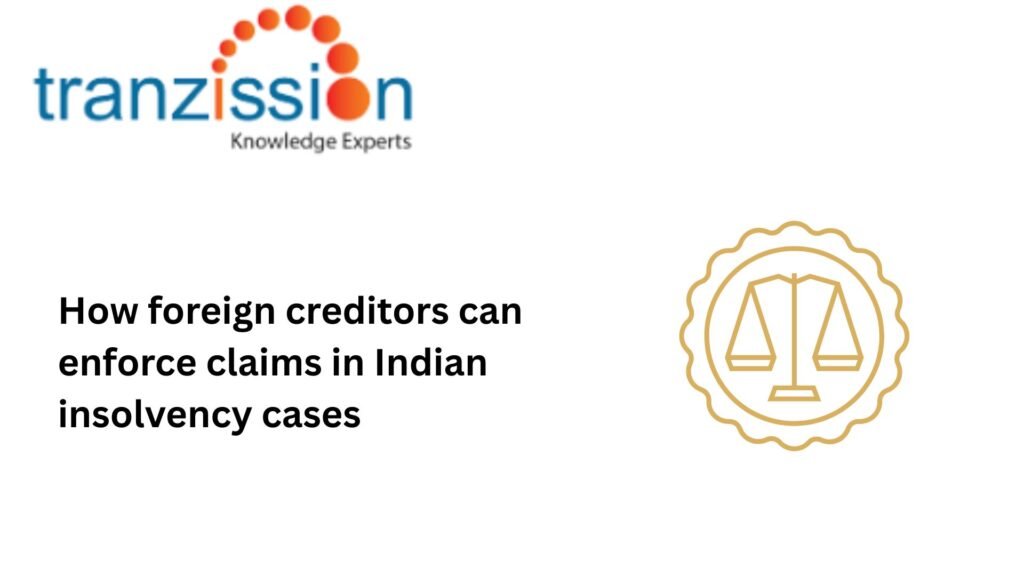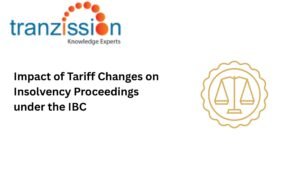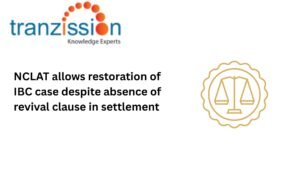
How foreign creditors can enforce claims in Indian insolvency cases

Table of Contents
The Insolvency and Bankruptcy Code, 2016 (“the IBC”) provides a mechanism for handling cross-border insolvency cases under sections 234 and 235. These sections allow the Indian Government to enter into agreements with foreign countries for enforcing the IBC and seek assistance from foreign courts in such matters. Many businesses have multiple locations outside of India, which may lead to several issues when the company undergoes insolvency. This makes it difficult for foreign creditors to effectively participate in proceedings, but there are still legal pathways for them to enforce their claims in Indian insolvency cases.
Legal Framework for Foreign Creditors in India
Recognition and Enforcement of Foreign Judgments:
This is primarily governed by sections 13 and 44-A of the Code of Civil Procedure (CPC), 1908. Section13 outlines the conditions under which a foreign judgement may not be considered conclusive:
- where it has not been pronounced by a Court of competent jurisdiction;
- where it has not been given on the merits of the case;
- where it appears on the face of the proceedings to be founded on an incorrect view of international law or a refusal to recognise the law of India in cases in which such law is applicable;
- where the proceedings in which the judgment was obtained are opposed to natural justice;
- where it has been obtained by fraud;
- where it sustains a claim founded on a breach of any law in force in India.
Section 44-A delas with the execution of decrees of superior courts of reciprocating territories, which are territories designated by the Central Government as reciprocating territories. Foreign judgements from these territories can be executed in India as if they were passed by a local District Court, certain conditions are met.
Read more : Legal consequences of misrepresentation in insolvency petitions
Enforcement of Foreign Arbitral Awards:
India’s adherence to the New York Convention and its impact on the enforcement through the Arbitration and Conciliation Act, 1996 significantly impacts the enforcement of foreign arbitral awards. India ratified the New York Convention in 1960, ensuring the recognition and enforcement of foreign awards made in signatory countries. The Arbitration and Conciliation Act provides the legal framework for this.
Participation in the Corporate Insolvency Resolution Process
Foreign creditors have the same rights as domestic creditors in initiating and participating the corporate insolvency resolution process (CIRP), this includes:
Filing claims in Indian insolvency cases:
Foreign creditors can file claims in Indian insolvency cases under the IBC before the National Company Law Tribunal (NCLT). They must submit their claims in Indian insolvency cases along with supporting documents to the resolution professional in the prescribed form, Form B, and on or before the last date specified in the public notice. A creditor can provide their claim through records in an information utility or other documentary evidence. Further, the RP may request additional evidence or clarification to substantiate the claim.
Committee of Creditors:
The Committee of Creditors (CoC) is a body comprising financial creditors of the corporate debtor, and it has the authority to make decisions regarding the insolvency resolution process. Foreign creditors have the right to participate in the CoC, which means they can attend meetings, vote on resolutions, and influence the decision-making process.
Judicial Assistance and Asset Recovery
Under the IBC and the CPC, various mechanisms are available for asset tracing and recovery, including asset tracing tools, the CIRP, and the CPC’s provisions for execution of decrees. Creditors can file avoidance applications to challenge and reverse certain transactions made by the debtor before the insolvency commencement date, especially if they are deemed preferential or fraudulent. The NCLT plays a pivotal role in granting moratoriums and injunctions during the CIRP to protect the debtor’s assets. It can also issue injunctions to prevent creditors from taking actions that could disrupt the CIRP or hinder the recovery of assets. In international law, the doctrine of comity requires courts to respect the orders of other courts, and can be relevant in cross-border insolvency cases, where the NCLT may need to consider orders issued by foreign courts in relation to the same debtor. This helps to ensure a more coordinated and efficient resolution of cross-border insolvency matters.
Challenges and Limitations
Absence of a comprehensive framework:
The IBC provisions are not fully effective due to the absence of reciprocal agreements with other countries. This means that foreign insolvency proceedings are not automatically recognised and enforced in India.
Jurisdictional Conflicts:
Determining the “centre of main interest” of a company, which is crucial for determining which jurisdiction should handle the insolvency proceedings, can be complex and disputed. The IBC’s lack of specific provisions on COMI further complicates this issue.
Procedural delays:
Cross-border insolvency cases are resolved through ad hoc protocols, which are time consuming and increase costs. This contrasts with a more structured approach like the UNCITRAL Model Law on Cross-Border Insolvency, which provides a framework for cooperation and recognition of foreign proceedings.
Lack of recognition and enforcement:
Enforcing foreign judgements or arbitration awards in India can be challenging due to the lack of a robust mechanism for recognising and enforcing them.
Uncertainty for foreign investors:
The lack of clear rules and procedures for cross-border insolvency can deter foreign creditors from engaging with Indian companies.
Judicial and institutional capacity:
The NCLT is often overburdened with cases, which can further delay cross-border matters.
Group insolvency issues:
India’s legal framework does not adequately address the complexities of group insolvency cases, which can involve multinational companies with assets and creditors in multiple jurisdictions.
Proposed Reforms and the Way Forward
To improve the treatment of foreign creditors in cross-border insolvency cases in India, the proposed reforms are:
- Adopting the UNCITRAL Model Law can provide India a framework for recognising foreign insolvency proceedings, thereby facilitating international cooperation and promoting fair and efficient resolution.
- Draft Part Z has been introduced in the IBC to specifically address cross-border insolvency issues, defining COMI and simplifying legal processes.
- Enhancing NCLT’s capabilities is necessary to equip the adjudicating body with expertise and resources to handle complex cross-border insolvency cases.
- India’s needs to develop bilateral agreements and establish a framework for managing cross-border insolvency cases involving global companies, ensuring smooth communication and cooperation between Indian and foreign courts.
Conclusion
Foreign creditors can enforce their claims in Indian insolvency cases through various avenues, including accessing local courts, seeking recognition of foreign insolvency proceedings, and obtaining relief to assist those proceedings. Indian courts can offer relief to assist foreign insolvency cases, such as facilitating the attachment of assets or directing and disclosures of assets and bank accounts. It is important for foreign creditors to be aware of the legal requirements for initiating and participating in the process, which can vary depending on the specific circumstances. Further, claims in Indian insolvency cases courts and insolvency professionals are encouraged to cooperate with foreign courts and other experts to ensure a suitable approach to cross-border insolvency cases.





